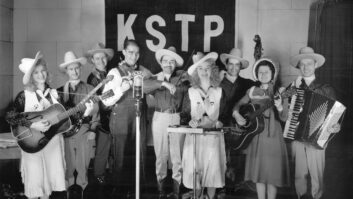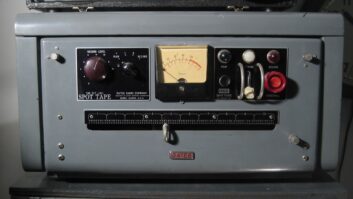
Q-Academy participants BRUSSELS, Belgium Flemish commercial station Q-Music is trying build its on-air future by launching the Q-Academy.
The training project for new radio staffers runs in close collaboration with the REC Radiocentrum training and education center.
According to Erwin Deckers, Q-Music program director, radio in Flanders is facing a dramatic shortage of new talent. “Over the seven years of Q-Music’s existence, we have seen only few new capable radio people joining the crew,” he said.
Massive response
“In the past,” said Deckers, “there was a kind of natural flow of radio presenters who made their first steps with the independent stations — each community had its own radio station, providing a natural habitat for presenters, allowing them to experiment with the medium, to train and to grow.”
Deckers said that these “breeding grounds” have all but disappeared.
“There are fewer stations and competition is fierce — stations take on limited on-air staff and have computers instead,” he said
Q-Music promoted the Q-Academy project via the airwaves late last year, inviting applications from those aged 15 to 25. The station received over 600 applications for a first test.
Deckers said that previously, when Q-Music ran recruitment campaigns, applicants faced a “glass ceiling” of perfection, and reaction was low.
But the idea of the Q-Academy, whose purpose is to train on-air staffers for the hit radio format, provoked a massive response. “We had to shut down registrations after six days — 600 people is a lot to work with already,” said Deckers.
With the Q-Academy, the station is aiming for a very specific education, starting where most other courses stop.
Specific elements
Specialized sound or film production schools and media training centers mostly offer theoretical content. “We want to take young radio talent in the studio and show them how to make hit radio,” said Deckers. “We know it is quite demanding.”
According to Deckers, a clear voice, technical background and creativity are the key elements. “You do not study things like ‘on-air personality’ and rhythmic feeling at school — that is where the academy comes in,” he said.
Training in a self-op studio, branding issues like imaging, station commercials, timing and getting accustomed to intros are amongst the specific elements in the education of the future presenters. In addition, the new on-air staffers receive training in voice control and diction.
The station filtered some 400 out of the 600 applicants to attend the Q-Academy selection day last December. The selections took place at Q-Music studios in the Vlaamse Media Maatschappij (VMMa) headquarters in Vilvoorde.
During the day-long screenings, each candidate had to do a speech test, with a jury of Q-Music hosts assessing the performance.

Julie Putteman, 18, at the mic For the selection day, Q-Music teamed up with the REC Radiocentrum, which elaborated the concept of a radio academy based on examples abroad.
Instant popularity
“We took on the reception of the candidates and provided them with advice and basic knowledge, prepared them for the test,” said Sven De Coninck, coordinator of REC Radiocentrum. “We also offer additional training to candidates who were not selected.”
“Five candidates out of the 400 passed the first screening, and this meets the initial target,” said Deckers. “And if we manage to educate one really good radio-host by the end of this year, this would be great and above all expectations.”
The jury found that the majority of the candidates had little feeling for the medium but were just looking for instant popularity, not the correct approach for the Q- Academy.
“The main issue is that youngsters do not have the opportunities to work in a radio environment,” said De Coninck. “Collecting ‘flight hours’ is what it is all about, and talent is very often lost due to a lack of education and training possibilities.”
De Coninck said that REC Radiocentrum plans to launch a network of radio education projects in 13 towns across Flanders.
Q-Music scheduled radio classes for the first five successful applicants to take place on Saturdays, to keep from interfering with work or school, with the option to specialize on weekdays.
Providing the training are experienced Q-Music staffers, with master classes by REC Radiocentrum and contributions from specialists such as a speech therapist.
Marc Maes is a free-lance media and music industry journalist based in Antwerp, Belgium. Contact him via e-mail at[email protected].







